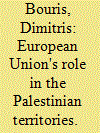| Srl | Item |
| 1 |
ID:
161366


|
|
|
|
|
| Summary/Abstract |
This article examines the diplomatic practices of contested states with the aim to challenge structural legal-institutional accounts of these actors’ international engagement, which are unsatisfactory in explaining change and acknowledging their agency. Considering contested states as liminal international actors, their diplomatic practices stand out for their hybridity in transcending the state versus nonstate diplomacy dichotomy, as well as for their structure-generating properties in enabling social forms of international recognition—absent legal recognition. The concept is empirically applied to examine the everyday interaction between the representatives of Palestine and Western Sahara and the European Union (EU)’s institutions in Brussels. It is argued that there has been a renewal and expansion of the Palestinian and Sahrawi repertoires of diplomatic practices vis-à-vis the EU, which has entailed growing hybridization. Innovation originated in more “transformative” diplomatic practices capitalizing on the contested states’ own political in-between-ness, which established relations that contributed to constituting and endogenously empowering them in the Brussels milieu. The way was thus paved for more “reproductive” diplomatic practices that mimic traditional state diplomacy to gain prominence. The impact achieved on “high politics” demonstrates how bottom-up practice-led change may allow contested states to compensate for their meagre material capabilities and punch above their structural weight in international politics.
|
|
|
|
|
|
|
|
|
|
|
|
|
|
|
|
| 2 |
ID:
171812


|
|
|
|
|
| Summary/Abstract |
The main purpose of this Special Issue is to interrogate the role of the European Union (EU) as a state-builder in its Near Abroad.1 It aims to make a three-fold contribution to the existing literature. Firstly, it provides working definitions on contested statehood and state-building, paying particular attention to how their properties map onto the EU’s own policy tools and the (diverse) nature of the conflicts with which it seeks to engage. Secondly, it engages with three sets of distinct conceptual literatures that are not often cross-fertilised: (i) the international relations scholarship on contested statehood and state-building; (ii) conceptualisations of EU ‘actorness’ in international affairs; and (iii) the literature on the external dimension of Europeanisation and the use of conditionality as a tool of projecting EU power to partner countries. Thirdly, it borrows from the literature on political geography in order to build an interdisciplinary perspective on EU geopolitical imaginations and the geographical dimensions of the EU’s border expansion and crisis management.
|
|
|
|
|
|
|
|
|
|
|
|
|
|
|
|
| 3 |
ID:
171819


|
|
|
|
|
| Summary/Abstract |
This paper examines the EU Police Mission in the Palestinian Territories (EUPOL COPPS) with a focus on its effects on everyday police work on the ground. The main argument is that the mission illustrates the ways in which its training and advisory activities work to foster logics and practices that feed into and reproduce the borders that have over the years been imposed, primarily through Israeli security practices. Operating under conditions of contested statehood, EUPOL COPPS promotes Palestinian policing activities based on particular spatial logics and actions as to the governance of the Palestinian population. The article presents new empirical material collected through interviews and document analysis. As such, it aims to build bridges between the literature on critical border studies, EU external relations, the EU’s role in the Israeli–Palestinian conflict as well as the literature on the EU police missions in conflict and post-conflict missions by emphasising their spatial dimension.
|
|
|
|
|
|
|
|
|
|
|
|
|
|
|
|
| 4 |
ID:
112773


|
|
|
|
|
| Publication |
2012.
|
| Summary/Abstract |
The aim of this article is to shed light on the distinctive role of the EU in Security Sector Reform (SSR) in the case of the Occupied Palestinian Territories (OPTs) and examine how SSR has contributed to the overall state-building project. Following the Oslo Accords, the EU engaged actively in the state-building project in the OPTs taking a number of initiatives on the ground. Since then security has been a key issue in all Israeli-Palestinian agreements and has also became synonymous with Palestinian statehood. The article draws upon literature on state-building and SSR and its central aim is to examine the distinctive initiatives that the EU has taken in order to help the Palestinian Authority (PA) reform both its security and judiciary sector as part of its broader state-building strategy towards the OPTs, as well as provide explanations on why these policies had limited impact.
|
|
|
|
|
|
|
|
|
|
|
|
|
|
|
|
| 5 |
ID:
163655


|
|
|
|
|
| Summary/Abstract |
The existing literature on state-building has focused mainly on post-conflict cases and ‘conventional’ examples of statehood, without taking into consideration the particularities of states that remain internally and/or externally contested. The EU’s engagement in Palestinian state-building through the deployment of EUPOL COPPS and EUBAM Rafah has generated various types of unintended consequences: anticipated and unanticipated, positive and negative, desirable and undesirable, some of which fulfill and some of which frustrate the initial intention. These have important reverberations for the EU’s conflict resolution strategies in Israel and Palestine, the most important being the strengthening of power imbalances and the enforcement of the status quo.
|
|
|
|
|
|
|
|
|
|
|
|
|
|
|
|